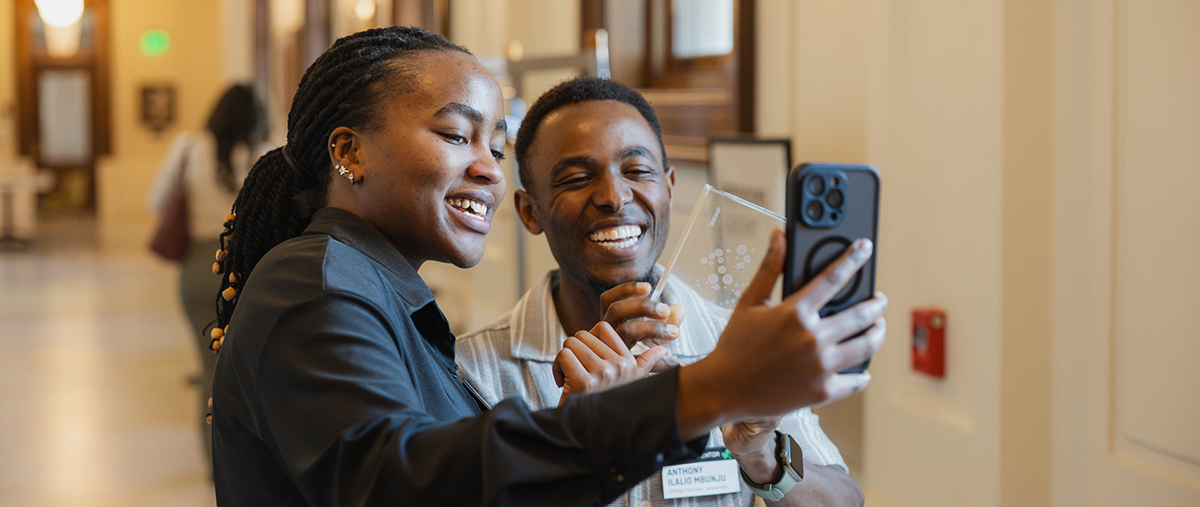November 17, 2025
Ferris State University converges global group of emerging leaders to create innovative, sustainable solutions in Wege Prize 2026

Wege Prize, the international student design competition hosted by Ferris State University’s Kendall College of Art and Design, has announced one of its largest rosters of highly diverse student competitors from around the world for the 2026 edition.
Hailing from 126 leading institutions of higher education everywhere from South Africa to North America, the competing students become pioneers of real-world approaches combating “wicked problems” facing the world today, such as hunger, pollution, and waste.
Started in 2014, Wege Prize challenges students in higher education to build collaborative teams creating actionable solutions — products, services, or business models — to address ongoing systemic issues affecting people and the environment. In this way, they take the opportunity inventive ideas into real-world solutions to help advance the regenerative, restorative economic framework known as the circular economy.
With an initial field of 87 student teams, Wege Prize 2026 welcomes 435 participants representing over 30 countries and almost 200 unique academic disciplines. With 52 graduate students and 17 doctoral candidates in addition to 366 undergraduates, the field of competitors brings together a highly international and diverse group of emerging leaders who believe they can make the world a better place.
This year’s Wege Prize teams are working on a range of innovative new ventures, including:
- Giving new life to lithium-ion batteries by creating a more reliable, faster, and scalable assessment tool to identify battery cells suitable for second-life applications – not just recycling.
- Helping communities anywhere in the world access water source quality, safety and sustainability information through an interactive, open-source online resource.
- Expanding the use of remanufacturing to create more "like new" remade products through an innovative tracking and data analytics system.
- Disrupting the harmful effects of the booming synthetic hair extension industry by replacing petroleum-based plastics with biodegradable plantain fibers.
“On behalf of Wege Prize, KCAD welcomes this very promising field of participants to their first phase of this exciting challenge, where innovative thinking and collaboration become a springboard for new and practical ideas to keep resources in use, regenerate natural systems, and eliminate waste,” said Gayle DeBruyn, a KCAD design professor and Wege Prize principal organizer. “In the face of mounting systemic challenges, these emerging young leaders are working across boundaries to build a better future, standing in stark contrast to a contemporary moment increasingly defined by divisiveness.”

Crafted with a proven process with distinct phases over nine months, Wege Prize challenges the student groups to improve their proposed solutions based on in-depth feedback from a multidisciplinary panel of expert judges. As the competition progresses, the judges select finalist teams to present their developed solutions and compete for cash prizes totaling $65,000 USD.
Designed to investigate complex, layered, “wicked problems” and to encourage students in higher education to take a diverse, collaborative approach, Wege Prize leads in promoting the development of new, tangible solutions for the circular economy. The student teams apply their business models or products to be implemented after the competition’s conclusion.
“Wege Prize is unique not just because it focuses on the circular economy, which very few competitions do, but because it asks its entrants to really think all the way around a challenge,” said Nathan Shedroff, a widely published author, educator and Wege Prize judge. “It’s not enough for your solution to just be well engineered, or systemic, or circular – it also has to be feasible, it has to be right for people, and it oftentimes has to help people change their behavior.”
Based on its success, Wege Prize has been awarded major grant funding in recent years to continue the annual competition. Through promotion and word-of-mouth at leading colleges and universities, Wege Prize has grown significantly in recognition and reach, continually drawing larger fields of participants from multiple continents. By institution location, 33 countries are represented this year, with more students at all levels of higher education.
Many Wege Prize competitors have built their ideas into successful ventures. Among the program’s notable achievers is the 2023 finalist team Banofi Leather, recognized this year by the United Nations Environment Program (UNEP), which has created a thriving enterprise around their formula for making faux leather from banana waste.
Another team called Rutopia, recognized by Wege Prize in 2019, garnered the attention of top editors at Forbes, among others, for their eco-sensitive tourism platform that empowers indigenous communities to be players in the ecotourism industry without sacrificing environmental stewardship.
“It’s a real honor being part of Wege Prize,” said the noted educator, entrepreneur and Wege Prize judge Alysia Garmulewicz. “It’s something where I really feel like I learn a lot myself from the students and the work they’re doing. I’m inspired by their passion and the breadth of their thinking.”

